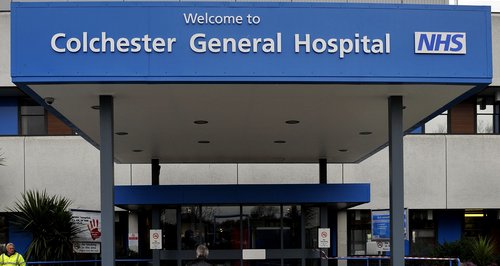Colchester: Hospital Trust Placed In Special Measures
14 November 2013, 10:46 | Updated: 14 November 2013, 10:57

A hospital trust at the centre of a police investigation over allegations that staff were forced to change cancer waiting times data has been placed in special measures.
A number of cancer patients suffered "undue delays'' at Colchester Hospital University NHS Foundation Trust, according to a report from the Care Quality Commission (CQC).
CQC inspectors found that there were "inaccuracies'' with waiting time data relating to cancer treatment. Staff told inspectors they were "pressured or bullied'' to change data relating to patients and their treatment to make it seem as though people were being treated in line with national guidelines.
As a result some patients may not have had the treatment they needed in time, according to the CQC.
The health sector regulator, Monitor, has now put the trust in special measures "to ensure all its patients receive good quality care''.
A formal investigation by Monitor found the trust had breached its licence to provide health services.
Under special measures, the trust will be required to "put right the patient quality, safety and governance concerns highlighted by the CQC'', Monitor said.
An improvement director will also be appointed by Monitor to ensure the trust turns itself around.
The hospital will also be matched with a high-performing trust which can offer support and expertise.
The trust must also publish and update an action plan that can be viewed by the public, Monitor said.
Adam Cayley, regional director for Monitor said: "Following the urgent actions already taken to safeguard patients at the trust we have stepped in formally to assure the health and wellbeing of patients using the cancer pathway at Colchester.
"The trust has been given an explicit set of actions to improve the service it offers patients. We will be monitoring progress closely and we will not hesitate to take further regulatory action if required.
"The leadership of the trust will be reviewed as part of our scrutiny of the trust's governance arrangements and, if necessary, further regulatory action will be taken.''
Trust chief executive, Dr Gordon Coutts, said: "Everyone at the trust was extremely concerned about the problems identified in the CQC report.
"We are truly sorry that in some cases cancer patients, their carers and families have not been given the high quality of care this trust always aims to provide.
"We have already taken action in response to the findings of the CQC report and we are continuing to address all of the concerns that were raised.
"Our priority is the safety and well-being of all our patients.''
Dr Coutts said the trust was contacting all 30 patients - or their next of kin where patients have died - identified by the CQC report.
Chief inspector of hospitals, professor Sir Mike Richards, said: "We welcome Monitor's decision to accept my recommendation to place Colchester Hospital University NHS Foundation Trust in special measures.
"I am pleased that information from CQC's inspection has resulted in the action that is being taken by Monitor to improve services at the trust. CQC will continue to monitor the trust in line with its regulatory responsibilities and this will include further inspections.''
Last week a spokesman for Essex Police said it had been contacted by the CQC and was reviewing the information to establish whether a criminal investigation was necessary.
Every year around 6,000 people go to Colchester Hospital University NHS Foundation Trust to be treated for cancer.
Unison regional head of health Tracey Lambert said: "The decision to take Colchester Hospital into special measures is the right one.
"The trust board has lost the confidence of patients and the public in north east Essex and people want to see strong, positive action to improve health care at the hospital.
"Unison members alerted executive directors at the hospital that they were being bullied into falsifying data relating to the treatment of cancer patients, but their concerns were not dealt with.
"We know that our members in other departments also believed they would not be listened to if they spoke out about their fears. Unison repeatedly made this point to the trust .
"In light of what has happened at Colchester, there is a need for a significant change of leadership and we look forward to working with the new regime.''


